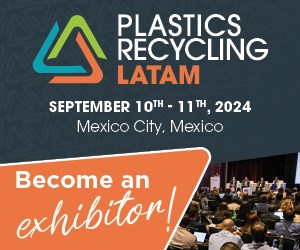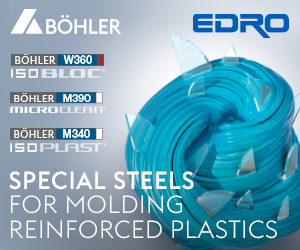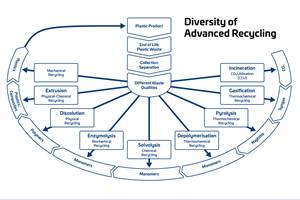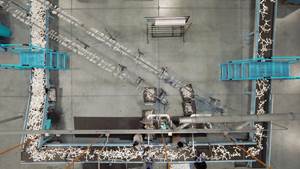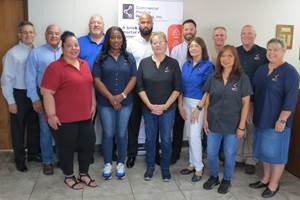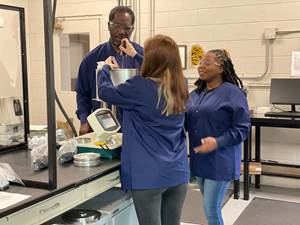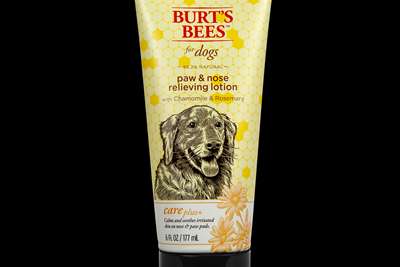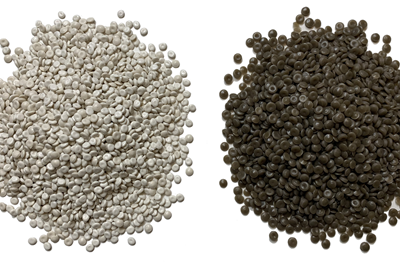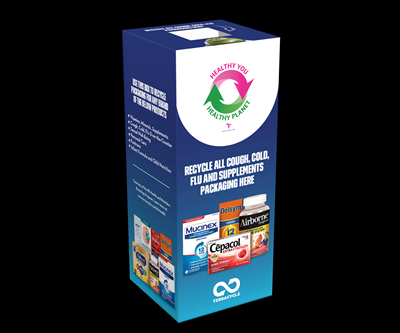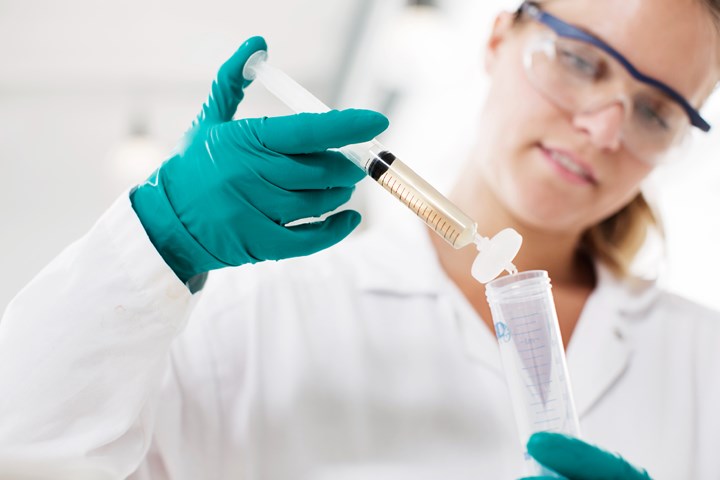
Cytiva’s goal is to recycle 500,000 syringe filters this year, roughly equal to 3500 lb of filtration devices. (Photo: Cytiva)
When recycling is mentioned, the focus is often on big—big goals, big volumes and so forth. But in order to truly achieve a circular economy, you have to think both big and small.
Syringe filters, which are about the size of a checkers game piece, are a key part of any lab setting but are not reusable and can make up a large portion of waste from a facility.
Cytiva, a global life sciences company, makes more than 25 million syringe filters each year that are used in a variety of settings, from healthcare and pharmacies to monitoring air-pollution levels. Cytiva assembles the filters from components that are made by other firms.
Cytiva estimates that industry-wide, hundreds of millions of filters are disposed of yearly. Recycling the filters has been complex as they contain a filter membrane that must be separated from the housing prior to recycling. The most common material used in the filters is polypropylene for the injection molded housings and a wide variety of materials for the filter membrane, including PVDF, PTFE, PET, nylon, polycarbonate, ceramic and various fabrics. The filters often contain nonhazardous biomass as well. Cytiva assembles the filters using ultrasonic welding.
“We call it ‘recycling the unrecyclable’ because it truly hasn’t been done before.”
Ryan Walker, sustainability program leader at Cytiva, said the company is focused on ways to increase sustainability. The idea of recycling syringe filters came up, but they knew it would be a challenge.
“Because of both what our customers put through the filters, and the encapsulation of this membrane, no one had ever figured out how to recycle these before,” Walker says. “And so our customers are left with one of two options: they can either landfill them, or they can incinerate them.”
Recycler TerraCycle in Trenton, N.J., partners with consumer-product companies, retailers and cities to recycle typically unrecyclable products and packaging that would otherwise end up in the landfill. The company has solved complex recycling challenges like diapers and cigarette filters in the past and also has experience recycling materials from lab environments and handling mixed plastics.
“I remember looking at the materials, the filter and syringes, and thought, ‘Maybe we could do this,’” said Ernel Simpson, TerraCycle’s director of polymer engineering. “I had a conversation with some of the people on my team and we got to look at this and we found a method for recycling.”
Cytiva and TerraCycle have started a new program to convert these syringe filters into useable products. Cytiva’s goal is to recycle 500,000 syringe filters a year, roughly equating to 3500 lb of filtration devices. The project with TerraCycle will focus initially on the U.S. and only on customers that are not generating biological or hazardous waste. “We call it ‘recycling the unrecyclable’ because it truly hasn’t been done before,” Walker said.
The way the program works is that TerraCycle boxes are provided to labs to collect used filters. Each box can contain approximately 10,000 syringe filters. Once collected, the filters will be recycled into material suitable for use in industrial applications, such as composite decking, shipping pallets, and various compression molded products.
POET, a bioethanol company based in Sioux Falls, S.D., recently enrolled in the program, and five of its facilities nationwide are now participating. Syringe filters are the second-highest share of plastic waste in the lab.
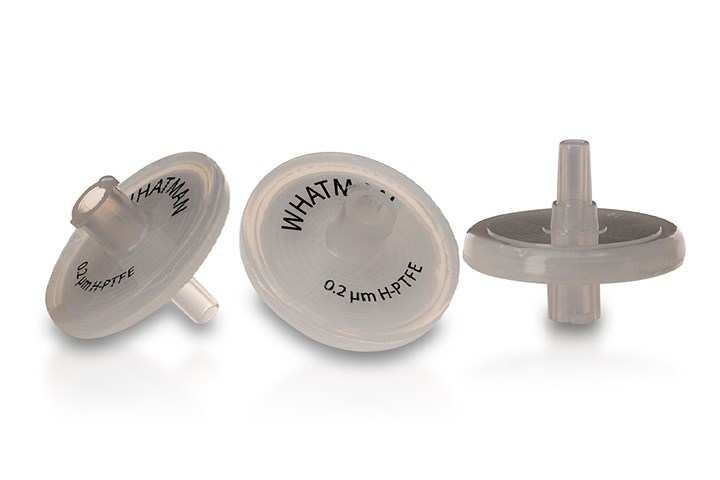
The syringe filters typically comprise an injection molded PP housing and a filter membrane made of any of a variety of materials, including PTFE. Cytiva assembles the filter units by ultrasonic welding. (Photo: Cytiva)
Size Reduction
One thing that always happens in recycling is size reduction. While these filters are small to begin with, Simpson says TerraCycle reduces it even more in order to remove the filter from the housing as they are typically of different materials. “We wanted a certain particle sizes so that, when the filter and housing are separated, we reduce the loss of material. The smaller the particle size is, the more losses you incur, and we wanted to reduce any loss to a minimum,” he said. “So we had a specific particle size that we shred the material to.” Separation is usually by density, using float/sink technology.
Most often, TerraCycle is working with syringe filters with PP housings. “We want to have polypropylene as clean as possible for possible reuse at Cytiva or elsewhere. The purity is what we're looking for,” Simpson says. “We are able to separate the filters from the housing after size reduction. So we have the filter material, and we have the PP housing, so we're able to get the PP and granulate that and use it as a feedstock.”
“We want to have polypropylene as clean as possible for possible reuse at Cytiva or elsewhere.”
The non-PP filter membrane materials separated from the PP housings are currently being stored until there is sufficient volume for a processing run. This is the case with all materials, as the processors work at scale. There is a recycling process for both the filters and the filter membranes and TerraCycle will recycle 100% of everything that they collect.
Cytiva receives a quarterly report from TerraCycle on how many syringe filters have been recycled. Walker says Cytiva would eventually like to buy back some of the recycled feedstock and use it in some of their products. “While TerraCycle uses the material in things like park benches, in our ideal world, we'd love to go much more circular,” Walker explains.
While at present, Cytiva wouldn’t be able to use recycled material in actual syringe filters, the firm could potentially use it in packaging and other products. “So we could say to customers that when you recycle it and buy from us again, it is a circular solution,” Walker notes.
Recycling half a million syringe filters is the goal for the first year and Walker anticipates increasing that every year. “While we're in our infancy with this project, we already have thousands of syringe filters that have been recycled currently, and more are coming in. And we're hoping that more will come in at a faster pace.”
Related Content
Advanced Recycling: Beyond Pyrolysis
Consumer-product brand owners increasingly see advanced chemical recycling as a necessary complement to mechanical recycling if they are to meet ambitious goals for a circular economy in the next decade. Dozens of technology providers are developing new technologies to overcome the limitations of existing pyrolysis methods and to commercialize various alternative approaches to chemical recycling of plastics.
Read MoreReversing Logistics for Plastic Film Recycling
Learn how Mainetti built a circular supply chain for clear film packaging.
Read MoreInside the Florida Recycler Gearing Up to Take on Scrap at NPE2024
Hundreds of tons of demonstration products will be created at NPE2024 next spring. Commercial Plastics Recycling strives to recycle all of it.
Read MoreSD Polymers: 'One-Stop Solution for Mechanical Recycling'
‘Passionate’ recycler invests in people and technology to meet commitment to innovative, sustainable solutions for its processor customers.
Read MoreRead Next
Designing Recycled Content: How Processors Fit In
Brand owners, material suppliers and processors weigh in on the challenges and opportunities of designing applications with recycled content.
Read MoreSpecifying PCR? Find Answers to These Eight Questions
Understanding how to work with the PCR available today is critical as packaging and other products are being redesigned for circularity.
Read MoreConsumer Goods Company RB, TerraCycle Talk Plastics Recycling Initiatives
TerraCycle and RB, maker of consumer brands including Mucinex and Enfamil, discuss ways the companies are working toward a circular economy.
Read More



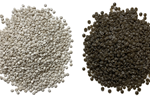
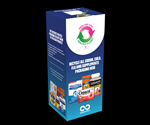




 (2).jpg;maxWidth=300;quality=90)




